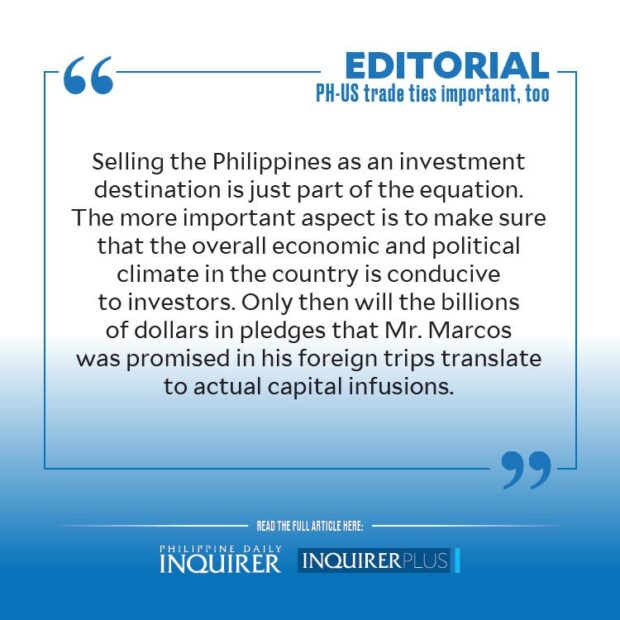PH-US trade ties important, too
The “ironclad” commitment of the United States to protect the Philippines against foreign aggressors as well as other security issues took the limelight during President Marcos’ official trip to Washington last week. While such a statement of support as embodied in the 1951 Mutual Defense Treaty between the two countries appears timely given the growing assertiveness of Beijing in disputed parts of the South China Sea, Mr. Marcos was spot-on in reminding the US that economic relations between the long-time allies should not be left behind while they strengthen defense cooperation. He cited, for instance, the delay in the US government’s renewal of the duty-free privilege given to thousands of Philippine export products that can help the country recover faster from the pandemic.
In a speech before businessmen there, Mr. Marcos made the pitch for the renewal of the Philippines’ inclusion in the US Generalized System of Preferences (GSP), a program that helps developing countries boost their exports by eliminating duties when these are imported by American companies. The country’s eligibility to export more than 5,000 products duty-free under the program expired at the end of 2020. That year, the GSP scheme benefited $1.6 billion worth of Philippine exports. More than two years have passed and its renewal remains pending in the US Congress.
At the same time, the government can work on the country’s participation in the Indo-Pacific Economic Framework for Prosperity (IPEF) that US President Joe Biden launched in May last year with a dozen initial partners, including the Philippines. With 60 percent of the world’s population, the US estimated that the Indo-Pacific will be the biggest contributor to global growth over the next 30 years. In effect, tapping the IPEF will allow the country to broaden its export markets outside of the traditional destinations such as the US, but the government must first initiate programs to enhance the productivity and competitiveness of local exporters so they would not be dependent on concessions such as the GSP and be able to compete head-on with other countries.
There is no denying the benefits of a head of state visiting other countries, especially in attracting investors. The Philippines was able to secure $1.3 billion in investment pledges during Mr. Marcos’ official visit to the US. The same was true for Mr. Marcos’ earlier foreign trips. But for these promises to materialize, the Philippines needs some housekeeping to do. It is not that the government is remiss in improving the investment climate. Foreign investors have lauded recent milestones that can help attract foreign capital, particularly the easing of the Public Service Act, the Foreign Investment Act, and the Retail Trade Liberalization Act. There is also the Anti-Red Tape Authority designed to address problems in dealing with government agencies. The Marcos administration is likewise pursuing a massive infrastructure program called “Build Better More.” The Philippines has also ratified the world’s biggest trade agreement to date, the Regional Comprehensive Economic Partnership Agreement.
However, much still needs to be done to improve the overall attractiveness of the country among foreign businessmen. The 2022 World Competitiveness Yearbook prepared by Switzerland-based International Institute for Management Development noted that the Philippines remained second to last among the 14 Asia-Pacific economies in the survey for the fifth straight year. The Philippines was also 13th among 14 economies in the region ranked by UK-based Oxford Economics on attractiveness to foreign investors, ahead only of Taiwan. The Philippines scored poorly in infrastructure, as reflected by the latest Global Competitiveness Report, where it ranked 92nd out of 140 countries in infrastructure quality. It also scored low in road connectivity and electrification as well as in the business environment, as indicated in the World Bank’s 2020 Ease of Doing Business report where it ranked above 70 out of 190 countries, lower than several of its regional peers.
There are many issues that the Philippines must address to improve the business environment. Corruption is a big issue that needs to be addressed, and so is the government’s commitment to human rights, which the European Union has raised as a condition for continuing the country’s GSP+ privileges. Sustaining infrastructure development, lowering unemployment, stabilizing inflation, reducing poverty, and investing in reforms on good governance and transparency are also necessary to boost the country’s competitiveness ranking. Selling the Philippines as an investment destination is just part of the equation. The more important aspect is to make sure that the overall economic and political climate in the country is conducive to investors. Only then will the billions of dollars in pledges that Mr. Marcos was promised in his foreign trips translate to actual capital infusions.





















